Kang Liu
NEAT: Neuron-Based Early Exit for Large Reasoning Models
Feb 02, 2026Abstract:Large Reasoning Models (LRMs) often suffer from \emph{overthinking}, a phenomenon in which redundant reasoning steps are generated after a correct solution has already been reached. Existing early reasoning exit methods primarily rely on output-level heuristics or trained probing models to skip redundant reasoning steps, thereby mitigating overthinking. However, these approaches typically require additional rollout computation or externally labeled datasets. In this paper, we propose \textbf{NEAT}, a \textbf{N}euron-based \textbf{E}arly re\textbf{A}soning exi\textbf{T} framework that monitors neuron-level activation dynamics to enable training-free early exits, without introducing additional test-time computation. NEAT identifies exit-associated neurons and tracks their activation patterns during reasoning to dynamically trigger early exit or suppress reflection, thereby reducing unnecessary reasoning while preserving solution quality. Experiments on four reasoning benchmarks across six models with different scales and architectures show that, for each model, NEAT achieves an average token reduction of 22\% to 28\% when averaged over the four benchmarks, while maintaining accuracy.
WideSeek: Advancing Wide Research via Multi-Agent Scaling
Feb 02, 2026Abstract:Search intelligence is evolving from Deep Research to Wide Research, a paradigm essential for retrieving and synthesizing comprehensive information under complex constraints in parallel. However, progress in this field is impeded by the lack of dedicated benchmarks and optimization methodologies for search breadth. To address these challenges, we take a deep dive into Wide Research from two perspectives: Data Pipeline and Agent Optimization. First, we produce WideSeekBench, a General Broad Information Seeking (GBIS) benchmark constructed via a rigorous multi-phase data pipeline to ensure diversity across the target information volume, logical constraints, and domains. Second, we introduce WideSeek, a dynamic hierarchical multi-agent architecture that can autonomously fork parallel sub-agents based on task requirements. Furthermore, we design a unified training framework that linearizes multi-agent trajectories and optimizes the system using end-to-end RL. Experimental results demonstrate the effectiveness of WideSeek and multi-agent RL, highlighting that scaling the number of agents is a promising direction for advancing the Wide Research paradigm.
A Dynamic Parametric Simulator for Fetal Heart Sounds
Jan 23, 2026Abstract:Research on fetal phonocardiogram (fPCG) is challenged by the limited number of abdominal recordings, substantial maternal interference, and marked transmissioninduced signal attenuation that complicate reproducible benchmarking. We present a reproducible dynamic parametric simulator that generates long abdominal fPCG sequences by combining cycle-level fetal S1/S2 event synthesis with a convolutional transmission module and configurable interference and background noise. Model parameters are calibrated cyclewise from real abdominal recordings to capture beat-to-beat variability and to define data-driven admissible ranges for controllable synthesis. The generated signals are validated against real recordings in terms of envelope-based temporal structure and frequency-domain characteristics. The simulator is released as open software to support rapid, reproducible evaluation of fPCG processing methods under controlled acquisition conditions.
Learning How to Remember: A Meta-Cognitive Management Method for Structured and Transferable Agent Memory
Jan 12, 2026Abstract:Large language model (LLM) agents increasingly rely on accumulated memory to solve long-horizon decision-making tasks. However, most existing approaches store memory in fixed representations and reuse it at a single or implicit level of abstraction, which limits generalization and often leads to negative transfer when distribution shift. This paper proposes the Meta-Cognitive Memory Abstraction method (MCMA), which treats memory abstraction as a learnable cognitive skill rather than a fixed design choice. MCMA decouples task execution from memory management by combining a frozen task model with a learned memory copilot. The memory copilot is trained using direct preference optimization, it determines how memories should be structured, abstracted, and reused. Memories are further organized into a hierarchy of abstraction levels, enabling selective reuse based on task similarity. When no memory is transferable, MCMA transfers the ability to abstract and manage memory by transferring the memory copilot. Experiments on ALFWorld, ScienceWorld, and BabyAI demonstrate substantial improvements in performance, out-of-distribution generalization, and cross-task transfer over several baselines.
OPBO: Order-Preserving Bayesian Optimization
Dec 22, 2025Abstract:Bayesian optimization is an effective method for solving expensive black-box optimization problems. Most existing methods use Gaussian processes (GP) as the surrogate model for approximating the black-box objective function, it is well-known that it can fail in high-dimensional space (e.g., dimension over 500). We argue that the reliance of GP on precise numerical fitting is fundamentally ill-suited in high-dimensional space, where it leads to prohibitive computational complexity. In order to address this, we propose a simple order-preserving Bayesian optimization (OPBO) method, where the surrogate model preserves the order, instead of the value, of the black-box objective function. Then we can use a simple but effective OP neural network (NN) to replace GP as the surrogate model. Moreover, instead of searching for the best solution from the acquisition model, we select good-enough solutions in the ordinal set to reduce computational cost. The experimental results show that for high-dimensional (over 500) black-box optimization problems, the proposed OPBO significantly outperforms traditional BO methods based on regression NN and GP. The source code is available at https://github.com/pengwei222/OPBO.
Bottom-up Policy Optimization: Your Language Model Policy Secretly Contains Internal Policies
Dec 22, 2025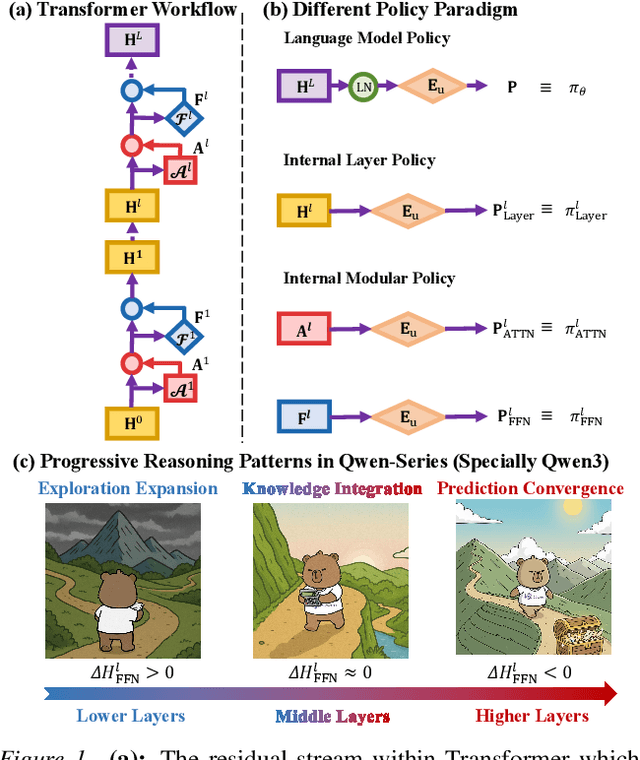
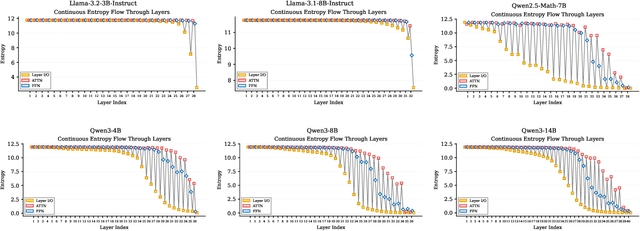
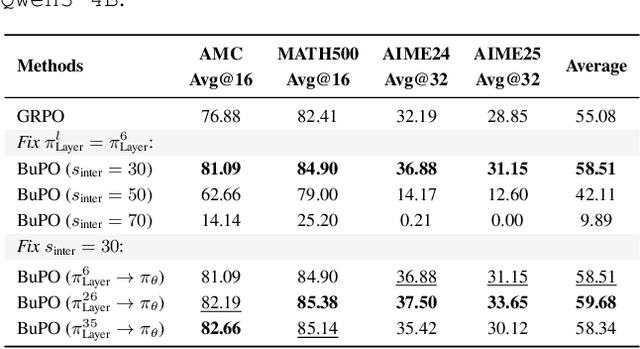
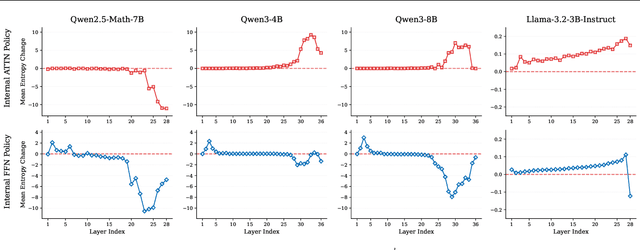
Abstract:Existing reinforcement learning (RL) approaches treat large language models (LLMs) as a single unified policy, overlooking their internal mechanisms. Understanding how policy evolves across layers and modules is therefore crucial for enabling more targeted optimization and raveling out complex reasoning mechanisms. In this paper, we decompose the language model policy by leveraging the intrinsic split of the Transformer residual stream and the equivalence between the composition of hidden states with the unembedding matrix and the resulting samplable policy. This decomposition reveals Internal Layer Policies, corresponding to contributions from individual layers, and Internal Modular Policies, which align with the self-attention and feed-forward network (FFN) components within each layer. By analyzing the entropy of internal policy, we find that: (a) Early layers keep high entropy for exploration, top layers converge to near-zero entropy for refinement, with convergence patterns varying across model series. (b) LLama's prediction space rapidly converges in the final layer, whereas Qwen-series models, especially Qwen3, exhibit a more human-like, progressively structured reasoning pattern. Motivated by these findings, we propose Bottom-up Policy Optimization (BuPO), a novel RL paradigm that directly optimizes the internal layer policy during early training. By aligning training objective at lower layer, BuPO reconstructs foundational reasoning capabilities and achieves superior performance. Extensive experiments on complex reasoning benchmarks demonstrates the effectiveness of our method. Our code is available at https://github.com/Trae1ounG/BuPO.
M-STAR: Multi-Scale Spatiotemporal Autoregression for Human Mobility Modeling
Dec 08, 2025Abstract:Modeling human mobility is vital for extensive applications such as transportation planning and epidemic modeling. With the rise of the Artificial Intelligence Generated Content (AIGC) paradigm, recent works explore synthetic trajectory generation using autoregressive and diffusion models. While these methods show promise for generating single-day trajectories, they remain limited by inefficiencies in long-term generation (e.g., weekly trajectories) and a lack of explicit spatiotemporal multi-scale modeling. This study proposes Multi-Scale Spatio-Temporal AutoRegression (M-STAR), a new framework that generates long-term trajectories through a coarse-to-fine spatiotemporal prediction process. M-STAR combines a Multi-scale Spatiotemporal Tokenizer that encodes hierarchical mobility patterns with a Transformer-based decoder for next-scale autoregressive prediction. Experiments on two real-world datasets show that M-STAR outperforms existing methods in fidelity and significantly improves generation speed. The data and codes are available at https://github.com/YuxiaoLuo0013/M-STAR.
Virtual Width Networks
Nov 17, 2025



Abstract:We introduce Virtual Width Networks (VWN), a framework that delivers the benefits of wider representations without incurring the quadratic cost of increasing the hidden size. VWN decouples representational width from backbone width, expanding the embedding space while keeping backbone compute nearly constant. In our large-scale experiment, an 8-times expansion accelerates optimization by over 2 times for next-token and 3 times for next-2-token prediction. The advantage amplifies over training as both the loss gap grows and the convergence-speedup ratio increases, showing that VWN is not only token-efficient but also increasingly effective with scale. Moreover, we identify an approximately log-linear scaling relation between virtual width and loss reduction, offering an initial empirical basis and motivation for exploring virtual-width scaling as a new dimension of large-model efficiency.
EPO: Diverse and Realistic Protein Ensemble Generation via Energy Preference Optimization
Nov 13, 2025Abstract:Accurate exploration of protein conformational ensembles is essential for uncovering function but remains hard because molecular-dynamics (MD) simulations suffer from high computational costs and energy-barrier trapping. This paper presents Energy Preference Optimization (EPO), an online refinement algorithm that turns a pretrained protein ensemble generator into an energy-aware sampler without extra MD trajectories. Specifically, EPO leverages stochastic differential equation sampling to explore the conformational landscape and incorporates a novel energy-ranking mechanism based on list-wise preference optimization. Crucially, EPO introduces a practical upper bound to efficiently approximate the intractable probability of long sampling trajectories in continuous-time generative models, making it easily adaptable to existing pretrained generators. On Tetrapeptides, ATLAS, and Fast-Folding benchmarks, EPO successfully generates diverse and physically realistic ensembles, establishing a new state-of-the-art in nine evaluation metrics. These results demonstrate that energy-only preference signals can efficiently steer generative models toward thermodynamically consistent conformational ensembles, providing an alternative to long MD simulations and widening the applicability of learned potentials in structural biology and drug discovery.
Bias-Restrained Prefix Representation Finetuning for Mathematical Reasoning
Nov 13, 2025
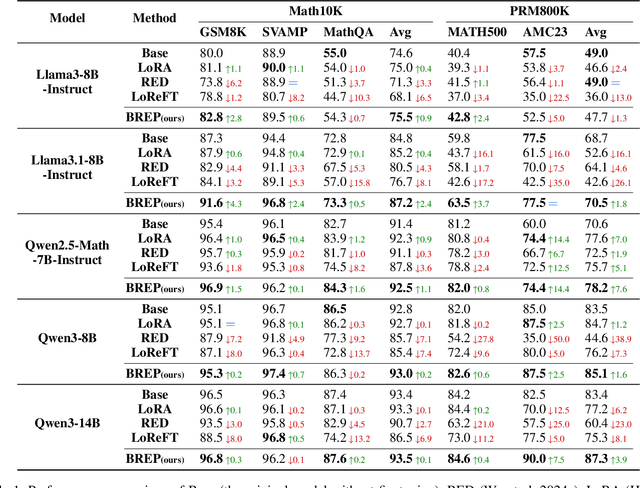
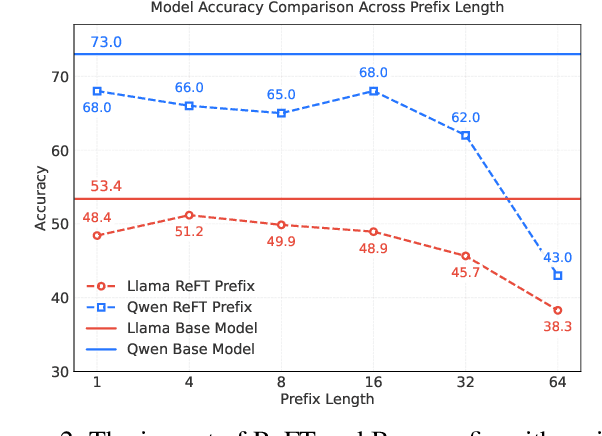
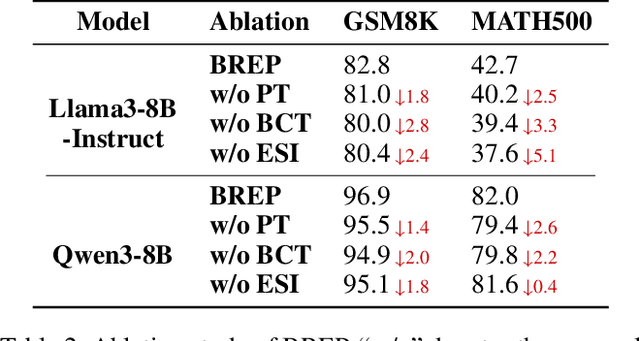
Abstract:Parameter-Efficient finetuning (PEFT) enhances model performance on downstream tasks by updating a minimal subset of parameters. Representation finetuning (ReFT) methods further improve efficiency by freezing model weights and optimizing internal representations with fewer parameters than PEFT, outperforming PEFT on several tasks. However, ReFT exhibits a significant performance decline on mathematical reasoning tasks. To address this problem, the paper demonstrates that ReFT's poor performance on mathematical tasks primarily stems from its struggle to generate effective reasoning prefixes during the early inference phase. Moreover, ReFT disturbs the numerical encoding and the error accumulats during the CoT stage. Based on these observations, this paper proposes Bias-REstrained Prefix Representation FineTuning (BREP ReFT), which enhances ReFT's mathematical reasoning capability by truncating training data to optimize the generation of initial reasoning prefixes, intervening on the early inference stage to prevent error accumulation, and constraining the intervention vectors' magnitude to avoid disturbing numerical encoding. Extensive experiments across diverse model architectures demonstrate BREP's superior effectiveness, efficiency, and robust generalization capability, outperforming both standard ReFT and weight-based PEFT methods on the task of mathematical reasoning. The source code is available at https://github.com/LiangThree/BREP.
 Add to Chrome
Add to Chrome Add to Firefox
Add to Firefox Add to Edge
Add to Edge